#i’m actually so hype about the new render coming out cause i haven’t played it before!! i have all the spoils tho cause ao3…
Text
don’t mean to be disrespectful but. i’m not sure why y’all are so excited about apollo justice coming out? like i think we’ve known for a while lol boy ain’t subtle
#some guest prosecutor trying to be witty: or should i say… mr INjustice!!#klav: *sipping a coffee* someone say my name?#apollo: don’t be so self deprecating klav!!#phoenix texting miles: 👀👀👀👀#miles watching a livestream: 🤨🤨💅💅👀👀#this is all /j btw#ace attorney#humour#klapollo#narumitsu#i’m actually so hype about the new render coming out cause i haven’t played it before!! i have all the spoils tho cause ao3…#don’t got no self control besties#anyways bye#stay hydrated
282 notes
·
View notes
Text
Heavy Rain - Video Game blog
(SPOILER WARNING: The following is an in-depth critical analysis. If you haven’t played this game yet, you may want to before reading this review)
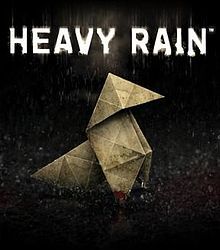
Do you remember the amount of hype that was building around this game at the time? Heavy Rain had caught the attention of multiple mainstream news sites with the promise that this was going to be the next big thing in games. A totally immersive, grown up drama that would bridge the gap between video games and films. Was it? Well... no. Eight years later, David Cage’s ‘interactive drama’ has been largely forgotten and while narratives in games did start to become more sophisticated in the 2010s, I’d argue that Heavy Rain didn’t really play that big a part as David Cage would like to think.
Heavy Rain is a murder mystery/psychological thriller. The Origami Killer kidnaps kids, drowns them in rainwater and leaves an origami figure in their hands and an orchid on their chests. The latest kid to get kidnapped is Shaun Mars and it’s a race against time to for the four main protagonists to save him before he dies. Like with David Cage’s previous game Fahrenheit, there is a good solid premise behind Heavy Rain. And to Quantic Dream’s credit, they have taken great strides to improve the gameplay. Instead of the stupid Simon Says system we got in Fahrenheit, Heavy Rain uses traditional QTEs and it works a lot better. It doesn’t distract you from what’s happening on screen and there are times where the game threatens to live up to its promise of being ‘immersive.’ For example when Ethan is having a panic attack in the train station and you have to physically move the wireless controller up and down to get him to walk or when Madison is picking a lock and you hold the L1 and R1 buttons down and tilt the controller to open the door. That’s good game design and it marries up quite nicely with what’s happening on screen. One thing I’m less keen on however is holding R2 to move the character. It feels so clunky and awkward, like you’re driving a car rather than moving a person. Nope. Don’t like that at all. Totally immersion breaking.
One gameplay mechanic I think had potential and wish was better handled is the ability to listen to a character’s thoughts by pressing the L2 button. That I thought was a legitimately clever concept and could have helped give the player an insight into the characters during pivotal moments. Like someone showing bravado only to listen to their thoughts and realise they’re actually terrified and just putting on an act. That could have been great. Instead the thoughts are either utterly mundane or are just there to give you tips when you’re stuck on how to progress. It feels like such a waste of potential.
I suppose I should quickly talk about the graphics considering they were a huge selling point at the time. The most realistic human faces ever, motion capture, blah blah blah. Except Heavy Rain wasn’t really the first game to use motion capture. The Uncharted games had used it for cutscenes and stuff. And honestly, I didn’t think the graphics were all that impressive even at the time. It’s the uncanny valley effect. There’s a reason why Pixar and Dreamworks make their human characters cartoony looking. It’s because rendering realistic looking humans on a computer is incredibly fucking difficult and people can instantly tell when it’s off. The characters in Heavy Rain look more like plastic action figures to me rather than actual people. Their movements and facial expressions just felt incredibly stilted and wooden to me, particularly during kissing and sex scenes where everything becomes really awkward and uncomfortable.
But never mind all of that. What about the writing? How does it compare to the insane laugh-a-thon that was Fahrenheit? Well if you’re after Tommy Wiseau-esque unintentional hilarity, you’re going to be slightly disappointed. Yes the writing is bad, but it’s not so bad it’s good like Fahrenheit was. It’s cliched, lacklustre and extremely limiting. The game boasts branching storylines and that all your choices matter, but in reality the story changes very little regardless of what you do. Yes there are loads of different endings, but what ending you get depends more on what happens in the final level than the rest of the game. As for characters dying at any time, that’s partially true. It’s impossible for Ethan and Scott to die before the end and when a character does die, all the game does is fence off certain levels.
In order to properly criticise and analyse the writing, let’s explore this character by character.
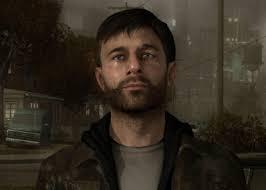
Ethan Mars
Out of all the characters, Ethan’s story is probably the most consistent and most satisfying to play. He’s the father of Shaun, the Origami Killer’s latest victim, and has to go through several Saw style trials in order to find him. I have to say, while the opening is extremely slow and tedious, forcing you to do all these mundane tasks like cooking and brushing your teeth and all this shit, as the game goes on, Ethan’s story comes the closest to delivering on the emotional and immersive experience David Cage promised. Pascal Langdale gives a pretty good performance for the most part and there were times where I did feel genuinely sorry for Ethan and his predicament. I’m not talking about the big set piece moments like when Jason dies at the beginning of the game. It’s the smaller scenes like Shaun doing his homework and Ethan looking on sadly at him or him sitting alone in his dusty office and reminiscing over his previous life before things went so wrong. That’s where the game really comes into its own. The trials too I thought were well written and designed for the most part. There’s some genuine tension in driving down the wrong side of the motorway or having to hack one of your own fingers off and it’s one of the rare occasions where the writing, acting and direction really come together and work as a cohesive whole.
That being said, there are still a litany of problems with Ethan’s story. The most glaring of which is the execution. While there are some legitimately powerful moments in Ethan’s story, they’re often ruined by David Cage’s overegging of the pudding. For example when Ethan has his panic attack in the train station, the motion controls and Langdale’s performance would have been enough to convey the pain and anxiety of the character. But then Cage takes it one step further with a stupid hallucination sequence with his dead kid Jason running round the station and people flopping over like ragdolls. Like... we get it. Ethan is depressed about his kid and that’s what has caused his fear of crowds. Even some of the mundane activities at the beginning of the game like making sure Shaun eats his dinner and does his homework on time could have been impactful if Cage didn’t drag it on for fucking hours and bore us into a coma as a result. In visual media, less is more. But the problem is David Cage seems so insecure about his own writing ability that he ends up overcompensating and bludgeoning the player over the head with these gaudy and over the top moments instead of just letting the performances of the actors convey the emotions and allowing the scene to speak for itself.
And then there are the moments and plot points that are just plain weird. So after his first son Jason dies in a car accident, Ethan starts experiencing blackouts. Not a bad idea, but the way they’re implemented is beyond incompetent. For starters Ethan has only two blackouts in the whole game and then it’s never mentioned or brought up again. Not even at the end when Shaun is all safe and sound (assuming you made all the right choices). Are we meant to assume that Ethan is magically cured after all this? And what exactly does Ethan get up to during the blackouts? When he regains consciousness, he’s always near Carnaby Square holding an origami figure. The significance of Carnaby Square is explained later on, but not how or why Ethan goes there during his blackouts. The only reason this is here is to plant the red herring that Ethan is the killer, except that’s utter bollocks. If Ethan was the killer, why would he kidnap a bunch of kids before his own? Were they just practice? What would be his motive? How did he learn to do origami? Where would he get the resources to create all these trials? What about the trials that involve him doing something in front of the camera or taking a photo as proof? If he’s responsible for these trials, who the hell is verifying this stuff? It’s utterly nonsensical and thus a complete waste of time. Apparently Ethan was supposed to share a psychic connection with the killer in the original script, but this was cut for time. The blackouts and stuff should have been cut too because it just doesn’t make sense with the current plot.
While there are a lot of flaws, I honestly would have been okay with Heavy Rain if the focus was just on Ethan. It wouldn’t have been a great game by any means, but it would have been decent enough. Unfortunately we’ve got three other characters to contend with, starting with...
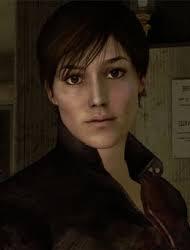
Madison Paige
Let us turn our attention from the best character to the worst. I was amazed by the number of critics and gamers praising Madison for her strong characterisation because she has got to be one of the worst examples of video game sexism I’ve ever seen. The way David Cage writes and presents her is frankly despicable. She exists solely to be exploited. Cage’s obsession with her body is utterly disturbing. All characters, male and female, get shower scenes, but Madison is the only one that appears fully nude and the cameras pans across her entire body so you can see every inch of it. It’s really pervy and uncomfortable to watch. Worse still, every threat against her life is always sexual in nature. It’s not enough to have a cliched mad doctor who butchers people. We’ve got to have a scene where he tries to stick a drill up her vagina. There’s even a scene where a nightclub owner forces her to perform a striptease at gunpoint. You have the option to knock him out with a lamp before you get too naked, but the game seems to actively encourage you to strip off. And no, the intention clearly wasn’t to disturb the audience. The way it’s shot and choreographed is similar to the shower scene, clearly intended for a male gaze. And even if the scene was intended to be disturbing, there are ways of creeping out the player without sexually objectifying or demeaning women. It’s absolutely revolting. If you want further proof that Madison is intended solely to be exploited, please note that she’s only character in the game who has a separate person doing the voice while another person, glamour model Jacqui Ainsley, provides the body and face because presumably Judi Beecher isn’t sexy enough for David Cage. I rest my case.
But it’s not just that. It’s the way she’s implemented into the story too. All the other characters have their plots and vices set up immediately. Madison never does. We find out she has insomnia, but it’s never followed up on. We don’t know what caused it or whether she recovers. In fact we never learn a single solitary thing about her character. Her main role (apart from being sexually exploited) is to prop up the male hero Ethan. Even when it doesn’t make sense to do so. She treats his injuries and even helps him escape from the police, becoming a fugitive, despite not knowing a single thing about Ethan’s predicament. Also I couldn’t help but get the strongest sense of deja vu when Madison suddenly started to try and snog Ethan’s face off. It’s exactly like the bullshit romance from Fahrenheit. It comes right the fuck out of nowhere and is handled with all the grace and subtlety of a glow in the dark rhino. At least Heavy Rain gives you the option to decline. I tell you I couldn’t slam the ‘Don’t Kiss’ button fast enough.
Madison really does feel like a pointless inclusion to the game. She brings nothing new to the story and is basically used as a get out of jail free card. If Ethan or Norman fail to find the location of Shaun, Madison can just phone either of them up and tell them, even though she never meets or interacts with Norman at any point in the game, thus rendering the progress in their stories completely pointless. They could have sat in the corner dribbling for the entire game and it would have led to the same conclusion providing Madison survives the fire. (and speaking of plot holes and bad writing, why did she act shocked when Ann Sheppard told her the killer’s name. She never interacts with Scott at any point in the game. How does she know who he is? Did nobody proof read this shit?).
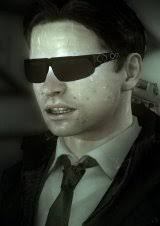
Norman Jayden
Here’s an idea to make playing this game more fun. When you get to the levels where you play as Norman Jayden, pretend he’s an alien from outer space. It would explain the daft VR sunglasses and Leon Ockenden’s terrible performance. I swear I’ve heard some bad American accents in my time, but this takes the fucking cake. I’m particularly amused by how camp Norman suddenly turns whenever he says the word ‘bastard.’
So. Norman. An FBI agent with a crippling drug problem... I think. He carries a tube of blue powder called triptocaine and sniffs it occasionally whenever he gets the shakes, but there’s a chance that this is actually caused by the VR sunglasses. There are several moments where a butler warns you not to overindulge in ‘you know what’ due to how dangerous it is. At first you think he’s referring to the triptocaine, but later it becomes clear he means the VR. So... what’s the point of the triptocaine then? Is he addicted to it or not? What’s he suffering withdrawal from? It’s all very unclear and poorly defined. And what exactly is the problem with the VR sunglasses? Why are they dangerous? How are they affecting him? We later see blood come out of his eyes, but how does that work? Not that any of this matters because it never actually links into the plot in any meaningful way. You can choose to either take the triptocaine or abstain and, aside from one level, the story carries on as normal regardless of your choice.
The thing is Norman Jayden’s story could have benefitted the most from the ‘your choice matters’ model. Imagine if the game actually gave you the freedom to investigate at your own pace. Allowed you to choose which suspects you question, which lead you follow, and have whether you find the killer or not all rely on the player’s own investigative abilities. Let the player find the clues and put together the solution themselves. Instead the game just yanks you from one false lead to the next and hands you solutions on a plate. This is a recurring problem throughout this game. Your choices simply don’t matter for the most part. David Cage merely wants to give the illusion of choice whilst forcing you down the path he wants you to take. There’s no real freedom or player choice. Actions very rarely have consequences and it all feels incredibly disappointing.
But the most excruciating thing about Norman Jayden isn’t even Norman Jayden. It’s the psychotic twat he has to hang around with. Lieutenant Carter Blake, police detective and arsehole. Throughout the game, Blake constantly butts heads with Norman and there never seems to be a good reason for it other than he’s a prick. Not just that, he often misuses his power, violently beating suspects for confessions and not only does Norman never report this, there’s also never a strong narrative reason for it. At first I thought Blake was just desperate to find the killer, but as it goes on you realise that’s not the case at all. He just enjoys being a violent dick. Why? I don’t know. And then there’s this whole witch hunt against Ethan. Ex wife Grace comes into the precinct to tell Blake about how Ethan dreams of drowning bodies and from then on Blake goes on a personal vendetta against Ethan, convinced he’s the Origami Killer. Except it doesn’t make the slightest bit of sense. For one thing, Ethan has an alibi. He was in a coma when the killings first started. Plus Grace says this happened in the spring and it’s been established that the Origami Killer only drowns his victims in the fall. There’s no concrete evidence tying Ethan to the crime. Just a vague, contradictory story from his ex wife. And yet Blake blindly goes along with it. Worse still, Norman never calls him out on it. It’s monumentally stupid writing. Did you know David Cage won a BAFTA for this game? How? Fucking how?!
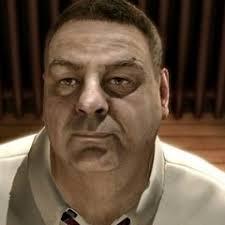
Scott Shelby
Finally we come to Scott Shelby, a private detective who has been hired by the families of the victims of the Origami Killer to investigate. I have mixed feelings about this story. The Scott levels are often very dull and repetitive with each level mostly playing out the same. Scott questions someone about the Origami Killer, they refuse to talk, Scott leaves, someone threatens the witness, Scott saves them, witness gives information. Wash, rinse, repeat. It gets very boring after a while, especially considering the information you learn is basically the same as what Norman learns. The whole thing just feels like a massive waste of time.
Scott suspects someone called Gordi Kramer to be the killer and has to contend with Gordi’s father Charles, but from the moment you meet Gordi, you know he can’t possibly be the killer and yet the game constantly focuses on the Kramers. Another issue I have is his relationship with Lauren Winter, the mother of one of the killer’s victims who tags along. Not only does she contribute nothing to the narrative other than making sad eyes every five minutes, the two also randomly kiss each other near the end despite sharing no hint of romantic chemistry. (seriously has David Cage ever been on a date with a human being before?).
But despite all of this, I found myself quite liking Scott. Sam Douglas gives the strongest performance of the four leads and the character comes off as warm and affectionate. Despite the tedium of the levels he’s in, it’s often his charm and likability that gets you through. Which is what makes the reveal that he’s in fact the Origami Killer all the more shocking.
Now when I first played this in 2010, I honestly thought it was a good twist. Scott pretended to be a private detective in order to find and dispose of evidence connecting to him. His obsession with Gordi Kramer was because he was insulted that there was another person killing children without a ‘good’ reason. I even liked the little detail that it was seeing Ethan throw himself in front of a car in an attempt to save Jason that sparked off the idea of the Origami Killer. It falls into that classic trope of heroes creating their own villains and it’s fairly well executed. However there is a little bit of cheating going on here. The timing of certain scenes doesn’t quite add up and some of the thoughts Scott has just doesn’t make sense when you know he’s the killer. Also this revelation opens up a ton of plot holes. Where did he get the money to buy all this stuff? The cars. The abandoned factory. The warehouse. The phones. The secret room in his apartment where he grows the orchids. He used to be a cop. There’s no way he could have had that much money in his retirement fund for all of this. Why did he subscribe to an origami magazine? Isn’t that a bit of a giveaway? Why did he buy the warehouse where he drowns his victims using his own name when he used his dead brother’s name for all of his other transactions? And what happened to his asthma? David Cage puts a lot of emphasis on his asthma in the early levels, but there’s never any payoff in the later levels. In fact it’s largely forgotten about. Scott gets into fist fights and even an over the top gunfight through a mansion and yet never gets an asthma attack when before he seemed to get them at the drop of a hat.
But the biggest question I have is this. Why Ethan? The Origami Killer kidnaps kids in order to test the fathers. To see how far they’d go to save their sons. As I said before, it was Ethan’s selflessness that inspired Scott to start the killings, to find a father that could do what his couldn’t. So why does he pick Ethan? He already knows that Ethan is prepared to sacrifice himself for his son. Why put him through all these tests? It just seems pointless. It gets even weirder at the end when Scott tries to kill Ethan. Again, the whole point of these murders is to test the fathers. Ethan succeeded. Why does he need to die? It completely goes against his modus operandi. And why use a gun to kill him? The final trial involves Ethan drinking poison, but then it’s revealed that the poison isn’t real. If Scott intended to kill Ethan, why not just use real poison? David Cage clearly hasn’t thought this through very thoroughly and this is a problem that extends throughout the entire game.
I applaud David Cage for wanting to tell different kinds of stories using the video game medium, but the fact of the matter is he’s simply not good at it. Yes video games are going through something of a renaissance right now, but I’d argue that it’s in spite of Heavy Rain rather than because of it. We have seen some truly incredible games over the past decade. Games that have redefined what you can do with the medium and told really engaging stories. Telltale’s The Walking Dead, The Last Of Us, The Stanley Parable, BioShock, the Mass Effect trilogy, Horizon Zero Dawn, Life Is Strange and many more. These games have truly innovated and expanded the medium. Heavy Rain however does the opposite. David Cage talks about innovating games, but if you look at what inspires him as a writer and how Heavy Rain is designed and structured, you’d think that Cage was embarrassed by video games. He’s trying so hard to make Heavy Rain more cinematic, but it doesn’t work because it’s not a film. It’s a video game. In fact if this was a film, it would be laughed out of every film festival. It’s cliched, boring, insulting and just plain stupid. Yes it’s unique, but unique doesn’t necessarily equate to good.
Five years later, Supermassive Games would adopt this style of storytelling for the truly brilliant Until Dawn and it works so much better because there is effort to actually tell a compelling story with relatable characters and to give your choices actual meaning and impact. Heavy Rain however just gets bogged down in its own pretentiousness, pouring scorn over the medium being used to tell the story without offering anything of substance to replace it. There’s a reason why people don’t talk about Heavy Rain anymore and it’s not because it’s a BAFTA award winning ‘game changer’.
15 notes
·
View notes